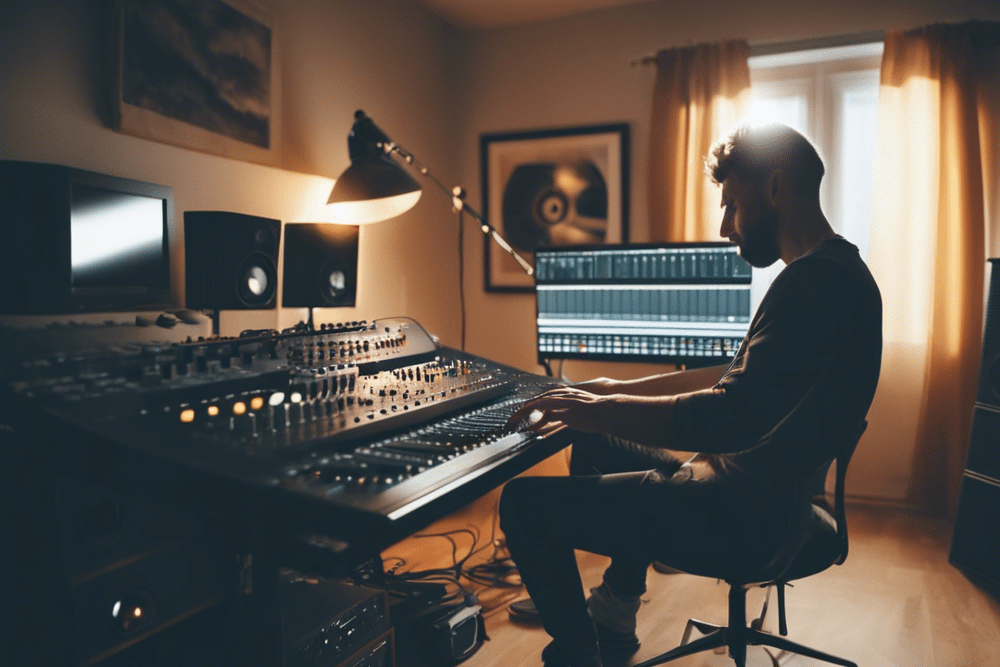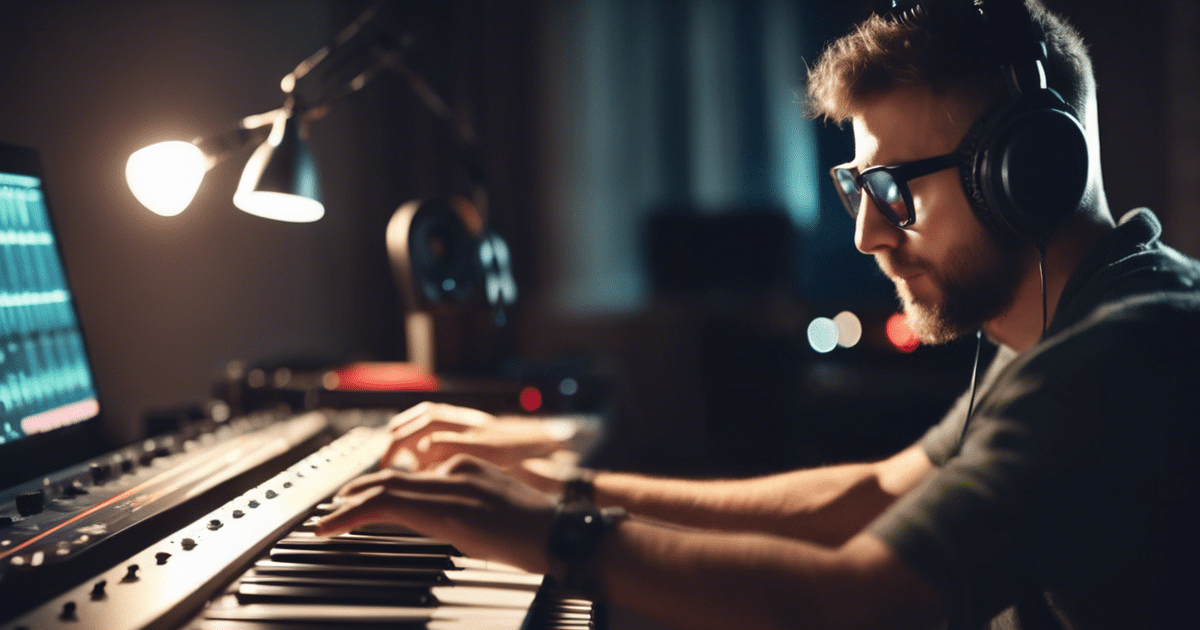Estimated reading time: 9 minutes
Introduction: The Journey Begins
Have you ever listened to your favorite song and wondered, “How did they create that amazing sound?” If so, you’re not alone. The world of music production is a fascinating blend of art and science, creativity and technology. Whether you’re a bedroom producer just starting out or an intermediate music producer looking to refine your skills, learning music production can open up a whole new world of possibilities.
In this comprehensive guide, we’ll explore the various aspects of music production, from understanding basic recording concepts to mastering advanced production techniques. We’ll delve into the tools and skills you need to create your own piece of music, and discuss the best resources available for those who want to learn music production. So, let’s dive in and embark on this exciting journey together!
Table of contents
- Introduction: The Journey Begins
- Understanding the Basics of Music Production
- Getting Started: Essential Tools for Music Production
- Learning Music Theory: The Foundation of Good Production
- Recording Techniques: Capturing the Perfect Sound
- Mixing: Bringing Your Tracks to Life
- Mastering: The Final Polish
- Learning Resources: Where to Gain Knowledge and Skills
- Developing Your Skills: Practice Makes Perfect
- Staying Current in the Ever-Evolving Music Industry
- Building Your Career in Music Production
- Overcoming Common Challenges in Music Production
- Video: Where To Start & How To Become a PRO: Learn Music Production
- Conclusion: Your Music Production Journey Awaits
- FAQs
Understanding the Basics of Music Production
What is Music Production?
At its core, music production is the process of creating recorded music. It encompasses everything from composing and arranging to recording, editing, and mixing. The music production process has evolved significantly over the years, thanks to advancements in technology. Today, anyone with a computer and some basic equipment can start producing music from their home.
The Essential Elements of Music Production
Before we dive into the specifics, let’s break down the key components of music production:
- Composition: Creating the melody, harmony, and rhythm of a song
- Arrangement: Deciding how different instruments and sounds will work together
- Recording: Capturing the audio of instruments and vocals
- Editing: Refining the recorded audio
- Mixing: Balancing and enhancing the different elements of a track
- Mastering: Preparing the final mix for distribution
Understanding these elements is crucial as you begin your journey to learn music production.
Getting Started: Essential Tools for Music Production
Digital Audio Workstations (DAWs)
The heart of modern music production is the Digital Audio Workstation, or DAW. This software allows you to record, edit, and mix your music. Some popular DAWs include:
- Ableton Live
- FL Studio
- Logic Pro X
- Pro Tools
- Cubase
Each DAW has its strengths, so it’s worth exploring a few to find the one that best suits your workflow.
Audio Interfaces
An audio interface is a piece of hardware that connects your instruments and microphones to your computer. It converts analog signals to digital, allowing you to record high-quality audio into your DAW.
MIDI Controllers
MIDI controllers, typically in the form of keyboard controllers, allow you to input musical data into your DAW. They’re essential for playing virtual instruments and programming drums.
Monitors and Headphones
Good quality monitors (speakers) and headphones are crucial for accurate mixing. They allow you to hear the true sound of your music without coloration.
Virtual Instruments and Plugins
These software tools emulate real instruments and audio effects, giving you a wide range of sounds to work with without needing physical instruments.

Learning Music Theory: The Foundation of Good Production
While it’s possible to create music without formal training, understanding music theory can significantly enhance your production skills. Key areas to focus on include:
Chord Progressions
Understanding how chords work together is fundamental to creating compelling harmonies in your music.
Song Structure
Knowing common song structures helps you arrange your music in a way that feels familiar and engaging to listeners.
Rhythm and Time Signatures
A solid grasp of rhythm and different time signatures allows you to create more interesting and complex musical patterns.
Scales and Modes
Understanding scales and modes gives you the tools to create melodies that fit well with your chord progressions.
“Music theory is like a map. It doesn’t tell you where to go, but it helps you navigate your musical journey more effectively.”
Recording Techniques: Capturing the Perfect Sound
Whether you’re recording acoustic instruments or electronic ones, good recording techniques are essential for achieving professional-sounding results.
Microphone Placement
For acoustic instruments and vocals, proper microphone placement is crucial. Experiment with different positions to find the sweet spot that captures the best sound.
Gain Staging
Setting appropriate input levels is vital to avoid distortion and maintain good signal-to-noise ratio.
Room Acoustics
The space you record in significantly affects the sound. If possible, treat your room with acoustic panels to reduce unwanted reflections.
Mixing: Bringing Your Tracks to Life
Mixing is where your individual tracks come together to form a cohesive whole. Here are some key aspects of the mixing process:
Balance
Adjusting the levels of different tracks to create a harmonious blend.
EQ
Using equalization to shape the frequency content of each track, helping them sit well together in the mix.
Compression
Controlling the dynamic range of your tracks to add punch and consistency.
Effects
Using reverb, delay, and other effects to add depth and interest to your mix.
Panning
Positioning sounds in the stereo field to create width and separation.

Mastering: The Final Polish
Mastering is the last step in the music production process. It involves:
- Balancing the overall frequency spectrum
- Adjusting the overall dynamics
- Setting appropriate levels for different playback systems
- Ensuring consistency across an album
While mastering is often left to specialists, understanding the basics can help you prepare your mixes better.
Learning Resources: Where to Gain Knowledge and Skills
Online Courses
There are numerous online platforms offering courses on music production. Some popular options include:
- BassGorilla (Electronic Dance Music, Drum and Bass, Dubstep and more)
- Berklee College of Music Online
- Coursera
- LinkedIn Learning
- Udemy
These platforms offer a wide range of courses covering various aspects of music production, from beginner to advanced levels.
YouTube Channels
Many experienced music producers share their knowledge on YouTube. Channels like BassGorilla, Andrew Huang, and In the Mix offer valuable insights and tutorials.
Books
While online resources are great, don’t overlook the value of books. Some recommended reads include:
- “Mixing Secrets for the Small Studio” by Mike Senior
- “The Recording Engineer’s Handbook” by Bobby Owsinski
- “Zen and the Art of Mixing” by Mixerman
Music Production Schools
For those looking for a more structured and comprehensive education, consider enrolling in a music production school. Institutions like Berklee College of Music, Full Sail University, and Point Blank Music School offer both online and on-campus programs.
Developing Your Skills: Practice Makes Perfect
Learning music production is not just about acquiring knowledge; it’s about applying that knowledge and developing your skills. Here are some ways to practice and improve:
Recreate Your Favorite Songs
Try to recreate songs you love. This exercise will help you understand how different elements work together in a professional production.
Experiment with Different Genres
Don’t limit yourself to one genre. Experimenting with different styles can broaden your skills and inspire creativity.
Collaborate with Others
Working with other producers or musicians can expose you to new techniques and perspectives.
Finish Your Projects
It’s easy to start many projects but harder to finish them. Set a goal to complete a certain number of tracks, even if they’re not perfect.
“The only way to get better at producing music is to produce music. Theory and knowledge are important, but nothing beats hands-on experience.”
Staying Current in the Ever-Evolving Music Industry
The music production industry is constantly changing, with new tools, techniques, and trends emerging regularly. To stay current:
- Follow industry blogs and news sites
- Attend music production conferences and workshops
- Join online communities and forums for music producers
- Regularly explore new plugins and software updates
Building Your Career in Music Production
As you develop your skills, you might start thinking about turning your passion into a career. Here are some potential paths in the music production industry:
- Studio Producer: Working with artists to record and produce their music
- Mixing Engineer: Specializing in mixing tracks for other producers and artists
- Mastering Engineer: Focusing on the final stage of music production
- Film and TV Composer: Creating music for visual media
- Sound Designer: Crafting unique sounds for various media
- Music Teacher or Instructor: Sharing your knowledge with aspiring producers
Each of these paths requires different skills and experiences, so consider what aspects of music production you enjoy most as you plan your career.
Overcoming Common Challenges in Music Production
Learning music production can be a challenging journey. Here are some common obstacles and how to overcome them:
Writer’s Block
When inspiration doesn’t strike, try:
- Using reference tracks for ideas
- Experimenting with a new instrument or plugin
- Setting limitations to spark creativity
Technical Difficulties
When faced with technical issues:
- Consult user manuals and online forums
- Take advantage of customer support for your tools
- Consider taking a course focused on the technical aspects of production
Perfectionism
Remember that perfect is the enemy of good. Set deadlines for yourself and learn to be satisfied with “good enough” as you’re learning.
Overwhelm
With so much to learn, it’s easy to feel overwhelmed. Break your learning into smaller, manageable chunks and celebrate small victories along the way.
Video: Where To Start & How To Become a PRO: Learn Music Production
Conclusion: Your Music Production Journey Awaits
Learning music production is a lifelong journey filled with creativity, challenges, and rewards. Whether you’re aiming to become the next chart-topping producer or simply want to create music for your own enjoyment, the skills you’ll develop along the way will open up a world of possibilities.
Remember, every great producer started as a beginner. With dedication, practice, and a willingness to learn, you can develop the skills needed to bring your musical visions to life. So fire up that DAW, put on your headphones, and start creating. Your masterpiece awaits!
“The beautiful thing about learning is that nobody can take it away from you.” – B.B. King
As you embark on your music production journey, keep this quote in mind. Every skill you learn, every technique you master, becomes a part of you. So embrace the learning process, enjoy the journey, and let your creativity soar. The world is waiting to hear what you create!
Related Posts
FAQs
Music production is the process of creating recorded music, involving composition, arrangement, recording, editing, mixing, and mastering. Each component contributes to transforming a basic musical idea into a polished final product ready for distribution.
To begin music production, you’ll need a Digital Audio Workstation (DAW), an audio interface, MIDI controllers, quality monitors or headphones, and virtual instruments or plugins. These tools enable you to record, edit, and mix your music effectively.
While you can produce music without formal theory knowledge, understanding music theory helps in crafting better compositions, creating harmonies, and structuring songs effectively. It’s a valuable tool that enhances creativity and improves production quality.
Mixing involves balancing track levels, using EQ to shape sounds, applying compression for dynamics control, adding effects like reverb and delay, and panning to create spatial depth. These techniques help blend all elements into a cohesive, professional-sounding mix.
Stay current by following industry blogs, joining online communities, attending music production conferences, and regularly exploring new plugins and software updates. Keeping up with trends ensures your production skills remain relevant and innovative.
